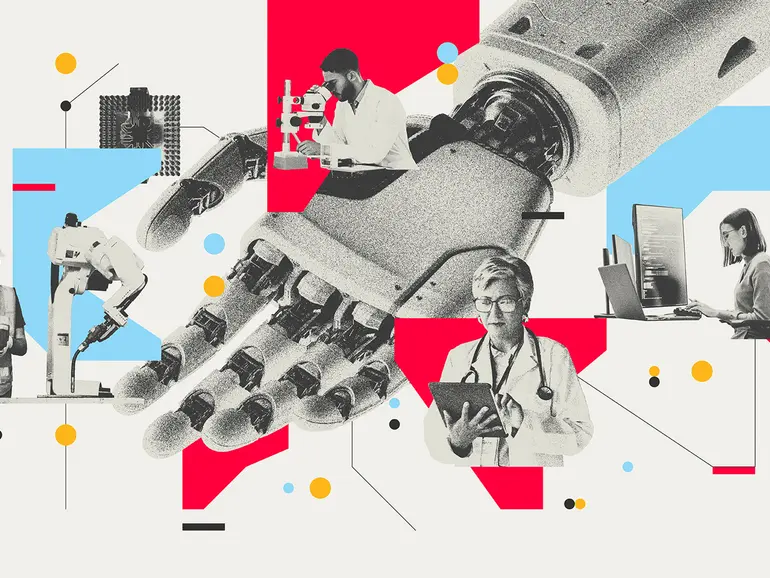Looking ahead at AI and work in 2026
Experts in artificial intelligence from MIT Sloan are keeping an eye on the human-LLM accuracy gap, AI guardrails, and other trends.

Faculty
Roberto Rigobon is the Society of Sloan Fellows Professor of Applied Economics at the MIT Sloan School of Management, a research associate of the National Bureau of Economic Research, and a Visiting Professor at IESA.
Roberto is a macro-economist who concentrates on measurement issues: economic, social, and ethical. He studies financial contagion, and the propagation of shocks through economic networks. He is one of the two founding members of the Billion Prices Project that produce alternative measures of inflation in many countries; And he is a cofounder and director of the Aggregate Confusion Project which studies how to improve ESG measures.
Roberto joined the business school in 1997. He has won s the Teacher of the Year Award five times, and the Excellence in Teaching Award three times at the Sloan School. He received his PhD in economics from MIT in 1997, an MBA from IESA (Venezuela) in 1991, and his BS in electrical engineering from Universidad Simon Bolivar (Venezuela) in 1984.
He is married with three kids.
Berg, Florian, Marco Ceccarelli, Florian Heeb, Alexey Ivashchenko, and Roberto Rigobon, MIT Sloan Working Paper 7345-25. Cambridge, MA: MIT Sloan School of Management, November 2025.
Cavallo, Alberto and Roberto Rigobon, MIT Sloan Working Paper 7322-25. Cambridge, MA: MIT Sloan School of Management, October 2025. SSRN.
van der Kroft, Bram, Juan Palacios, Roberto Rigobon, and Siqi Zheng, Working Paper. August 2025. SSRN.
Loaiza, Isabella, Roberto Vestrelli, Andrea Fronzetti Colladon, and Roberto Rigobon, MIT Sloan Working Paper 7323-25. Cambridge, MA: MIT Sloan School of Management, June 2025.
Berg, Florian, Jaime Oliver Huidobro, and Roberto Rigobon, MIT Sloan Working Paper 6969-24. Cambridge, MA: MIT Sloan School of Management, April 2025.
Loaiza, Isabella and Roberto Rigobon, MIT Sloan Working Paper 7236-24. Cambridge, MA: MIT Sloan School of Management, December 2024.

Experts in artificial intelligence from MIT Sloan are keeping an eye on the human-LLM accuracy gap, AI guardrails, and other trends.

To realize the greatest gains from artificial intelligence, we must make the future of work more human, not less.
A recent paper by professor Roberto Rigobon and postdoctoral associate Isabella Loaiza-Saa found that it is easier for humans to trust other humans than it is to trust technology, and the high-risk industry of money management intensifies the need for human connection. "The financial sector should be really careful about introducing technology that might erode trust," Loaiza-Saa said.
These days, a lot of workers have been asking themselves whether AI is coming for their jobs. In a recent paper professor Roberto Rigobon and postdoctoral researcher Isabella Loaiza-Saa(SM '19, PhD '23) came up with a measure of how much AI might be used to augment selected jobs and then calculated a measure of the risk of being replaced by AI.
Discussing her research on AI in the workplace, co-authored with professor Roberto Rigobon, post-doctoral researcher Isabella Loaiza-Saa said, "Clerical type of jobs can be more easily automated, but a great number of occupations are not going to be as impacted. Occupations that require critical thinking, judgment, and even creativity are not going to go away."
A recent study by professor Roberto Rigobon, Isabella Loaiza, and co-authors showed that LLMs consistently suggested that countries have less press freedom than official reports. The study found the LLMs distorting and under-counting the press freedom in nations that actually place relatively few restrictions on journalists. "Access to reliable information on the state and health of the institutions that uphold democracy is critical for civic participation," said Rigobon.
For many companies, the topic of sustainability is at the forefront of business agendas. Consumers and stakeholders are demanding greater accountability from organizations, and the regulatory environment is becoming increasingly stringent. However, pursuing the environmental, social, and governance impacts of business is often met with tension. Leaders now need to manage the misconception within business that meeting sustainability goals means compromising profits.
This international economics program presents tools and frameworks to help executives understand and predict the medium- to long-run performance of economies in order to mitigate risk, develop growth plans, and make investment decisions, both locally and abroad. Participants will leave this macroeconomics course better able to make business decisions that take global markets and macroeconomics into account and how to interpret economic change in the context of their organization.